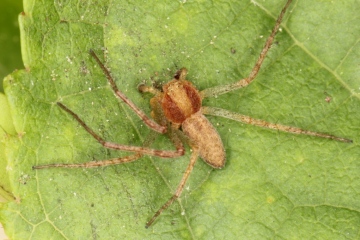Summary for Philodromus rufus sens. str. (Araneae)
previous species | next species
National Distribution
Terms of Use. Double-click on map to go to region

Explore Regional Distribution
Please log on and add a note on this species
About this species
Recorded altitude range15m to 25m
Species text
DistributionThe species is confined to southern England. It is widespread in Europe.
Habitat and ecology
In western France P. rufus occurred on young trees and scrub in open habitats, in contrast to the closely related P. albidus which was collected in high oak forest. Adults have been found frrom April to September with both sexes peaking in May.
Status
The species formerly known as P. rufus was split into P. rufus and P. albidus (Dondale 1972; Segers 1989) Dondale (1972) states that Pickard-Cambridge (1895) described and figured a male from Britain that matched the real P. rufus. P. rufus was then not found after the re-description of P. albidus until 2014, after it had been deleted from the British checklist (Merrett & Murphy 2000). Since that date it has been found regularly in the home counties and once in Exeter (Prince 2019). It could be overlooked to some extent because of the difficulty in identification from P.albidus.
Threats
The majority of records are from trees or bushes at the edge of clearings or in hedgerows. Lack of management resulting in the closure of open woodland and the loss of old hedgerows are almost certainly detrimental to this species. Spray drift from the use of pesticides on crops is likely to affect the survival of this spider, as well as many other invertebrates, where arable fields are adjacent to woodland or hedgerows.
Management and conservation
Management should retain open surroundings by rotational cutting of woodland ride vegetation, periodic control of scrub and tree invasion and light grazing in woodland pasture. The retention of wide field edges and headlands should be encouraged to help maintain a diverse invertebrate fauna and reduce the effects of spray drift on old trees in hedgerows and at the edge of woodland.
Original author of profile: M.Prince (albeit using information from the P.albidus account by P.R. Harvey) References
Adult Season
Habitats
background methodology
Recorded management for locations with Philodromus rufus sens. str.
Recorded substrate and hydrology for locations with Philodromus rufus sens. str.
Images
please log on and upload a new image for this speciesSee also A-Z Species Index - A-Z Picture Index - previous species | next species

